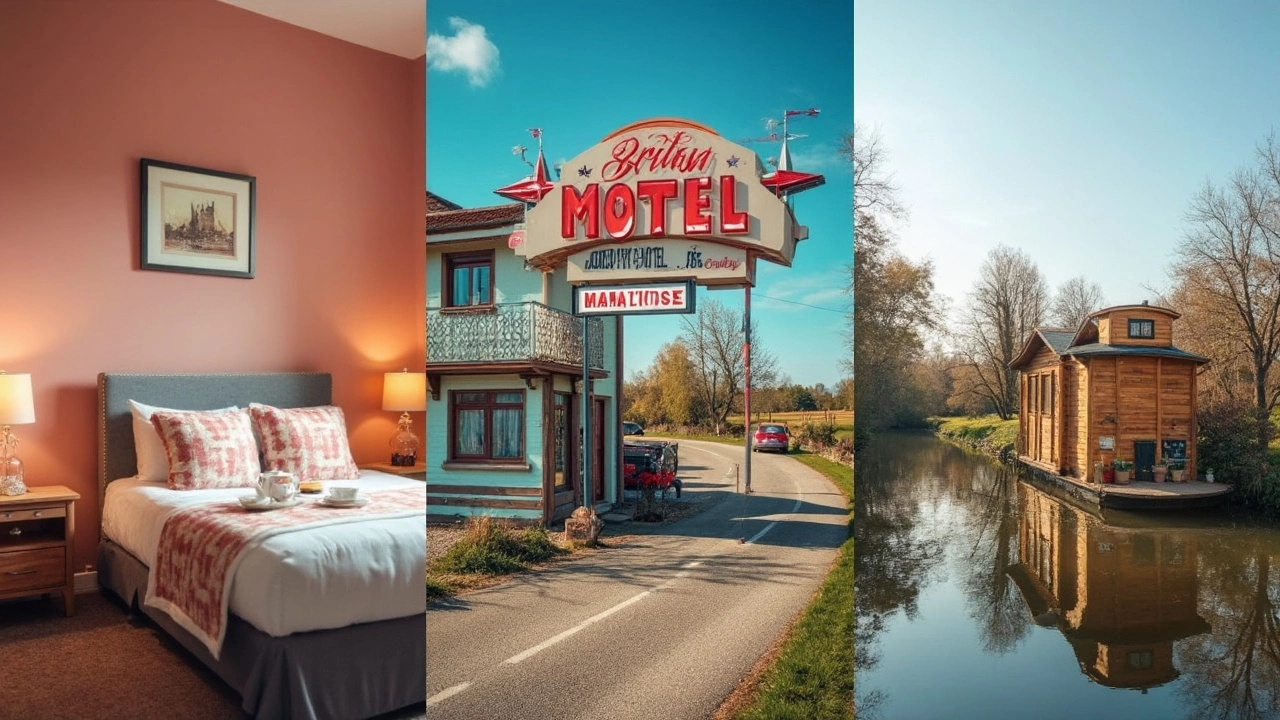Ever wondered if the so-called “cheapest hotel” is really a hotel at all? I have slept in enough places with weird carpet stains and extra-firm pillows to say this: the world of wallet-friendly stays is more surprising than most people think. Big hotel chains might throw around cheap weeknight deals, but if you really want to travel without blowing your shoe budget, you have to look beyond the obvious. Cheap accommodation coverage on travel sites often skims the surface. Behind the scenes, prices—and experiences—change wildly when you look at motels, hostels, capsule hotels, guesthouses, and new trends like micro hotels.
The Real Difference: Traditional Budget Hotels, Motels, and Hostels
Most people think "hotel" just means a tall building with a reception and a breakfast that looks like it came from a vending machine. But, in travel lingo, the name isn’t everything. Let’s break down what really matters.
Cheapest hotel might just mean the most basic private room you can book, but half the world’s cheapest "hotels" are actually motels. Motels originated in the US—literally "motor hotels"—catering to road trippers. They’re cheap because the focus is on function. Expect easy parking, basic rooms (sometimes a bit outdated), but usually private bathrooms. Motels might not win style points, but their prices often make up for that.
Hostels are even more wallet-friendly. Forget the college backpacker stereotype—today, hostels are everywhere, and they’ve upgraded. In Europe and Asia, countless hostels have private rooms, family suites, and even designer touches, all at rock-bottom prices. Don’t expect room service, though. The secret to their low cost? Shared facilities. Dormitory beds can run under $10 in many cities. For a family like mine, the private family room in a hostel with shared bathrooms once cost us a third of the cheapest hotel room down the street.
Budget hotels always seem like the safest option for people who need privacy but don’t want to take risks. But “budget” can mean very different things in different countries or even different cities. A chain like Ibis Budget in Europe packs tiny but functional rooms together, often with triple bunks, at lower rates because of scale. In developing countries, tiny independent hotels offering basic but clean stays can cost less than a burger combo if you know where to look.
Capsule hotels—Japan’s gift to the jet-lagged—mean you sleep in a little pod just big enough for you. They’re big on privacy but short on space, and you’ll share bathrooms and common areas. But for solo travelers wanting something different, they offer a rare blend of privacy, safety, and a unique experience for less than the price of a latte-laden breakfast in many cities.
Here’s the rundown:
- Hotels: Full amenities, private space and private bathroom (usually), but can be pricey.
- Motels: Cheaper, more basic amenities, usually private.
- Hostels: Cheapest for solo travelers or those willing to share space. Private rooms often available.
- Capsule Hotels: Cheap, tiny, unique, mostly in Asia (but spreading!).
- Guesthouses: Small, sometimes family-run, priced between hostels and hotels.
What’s wild is just how much prices can range depending on the country, season, and even the neighborhood. In Southeast Asia, a hostel bed can be cheaper than a movie ticket. In New York, it’s about picking which kidney to sell! (Kidding, but only just.) Research, especially reading recent reviews, is everything.

What to Expect: The Trade-Offs of Affordability
You probably guessed there’s a catch—comfortable beds and sparkling bathrooms cost money. At the cheapest tier, trade-offs are real but manageable if you plan ahead. Most hostels, motels, and budget hotels trade less space and fewer frills for their friendly prices. Expect less soundproofing, basic bedding, and the occasional groaning air conditioner (I still remember one in Rome that sounded like a freight train—Keir called it our “sleep concert”).
Security can be different, too. Hostel dorms offer lockers for your belongings—bring your own lock. Cheap hotels and motels typically use old-style key locks rather than state-of-the-art keycards. A little extra vigilance (and a travel door alarm—it’s like $10, look it up) can go a long way in keeping your peace of mind. Family-run guesthouses are usually safe and personal, but it’s a good idea to skim recent guest reviews just in case a building hasn’t seen upgrades since the last world cup.
Bathroom situations may vary wildly. In cheap motels or hostels, you may not get a private bathroom. Shared showers are normal in many hostels—pack rubber flip-flops and don’t expect to hog the hot water during peak hours.
If you’re used to huge hotel breakfasts, brace yourself: budget places either charge extra for breakfast or offer the classic “toast and instant coffee” situation. Hoard snacks, or do what I do and scout for the nearest bakery for a local treat (yes, I judge cities by their pastries…)
But all that said, sometimes the vibe is better than any four-star stay. I’ve met more real people in hostels than in fancy lobbies. Motels on long US road trips make life with kids like Keir so much easier—drive up, unload, crash for a night. In many cultures, guesthouses connect you with the local rhythms—morning hustle, late-night chats, homemade food. Don’t underestimate how much character you find by saving cash.
Some practical tips to get the most out of cheap stays:
- Bring a thin sleeping bag liner or pillowcase for peace of mind.
- Use maps to check location—not every budget stay is close to transit or attractions.
- Consider booking direct with guesthouses or hostels, not only third-party sites. You might get better rates or perks (free late checkout, local tips).
- Packing a USB charger and extension cord is a lifesaver. Outlets in budget places can be a gamble.
- If you have allergies, check reviews for mentions of mold or strong smells—budget places sometimes skip the renovation budget.
If you have kids, always email ahead to confirm what’s included (bedsheets cost extra sometimes in a few European hostels, which caught me out once). And don’t be shy: staff in hostels and guesthouses will nearly always help, especially if you show up smiling and maybe share a funny travel story.

Alternative Cheap Stays: Guesthouses, Couchsurfing, and Micro Hotels
Let’s go off the beaten path for a second. There are creative options nobody told you about in the travel brochures. Guesthouses—especially in Asia, Eastern Europe, or South America—are often the cheapest legal room around, with a bonus: home-cooked meals and real insight into daily life. I once stayed at a guesthouse in Kyoto run by a retired couple who made rice porridge every morning and gave us sightseeing tips you could never Google.
Couchsurfing is famous among real shoestring adventurers. It basically means staying for free on someone’s couch or spare bed—no exchange of money but a lot of expectation you’ll be friendly, clean, and open to conversation. Some couchsurfing hosts are legends—encyclopedias of local history, eager to go for a midnight city walk with their guests. As a solo woman or with kids, it pays to check reviews obsessively and chat with hosts before confirming. Safety always wins over saving a few dollars!
Micro hotels and pod hotels are a rising trend in big cities where floor space is expensive. Think New York, London, Tokyo. Micro hotels pack private rooms into tiny boxes, often just big enough for a bed, with a shower squeezed in next to the toilet. They’re more private than hostels but less fancy than chain hotels. For short visits or long layovers, they work—a nap, a shower, and gone in a blur.
Apps like Hostelworld, Booking, and Agoda let you sort by price, type, or guest reviews, and most show hidden gems you’d never find otherwise. Sometimes apartments or rooms for rent (think Airbnb, but the cheapest possible) undercut even hostels, especially if you book off-peak. Some cities have quirky solutions: temple stays in South Korea, ryokan in Japan (affordable if you skip fancy dinners), or pousadas in Brazil.
Here’s an example for planners: stagger your search across all types of cheap stays. Start with hostels and guesthouses, throw in micro hotels, and then—if you’re feeling adventurous—see what’s available on Couchsurfing or city-specific short-term rental platforms. In split-second price differences, you might end up in a cozy attic instead of a soulless chain hotel room.
People always ask me if safety is an issue when you aim for the lowest price. The answer is: usually not if you research and trust your instincts. Stick to places with good recent reviews (ignore anything older than 18 months), tap into online traveler communities, and when in doubt, call or message ahead. Most hosts and owners will happily answer questions—even random ones about luggage storage or kid-friendly restaurants nearby.
For digital nomads or longer stays, look into monthly rates or volunteer-for-lodging (Workaway, WWOOF) gigs. Sometimes you pay nothing and come home with wild stories and new skills—Keir still talks about the time we “helped feed” chickens at a countryside hostel in Slovenia, which was mostly me chasing hens and spilling half the feed.
So, the next time you’re traveling and want the absolute lowest prices, widen your search well beyond standard hotels. From motels to hostels, guesthouses, micro hotels, and even someone’s spare couch, there’s a world of affordable places to sleep—each with its pros, quirks, and stories to tell. Who knows? The cheapest bed you find just might be the most memorable part of your adventure.
